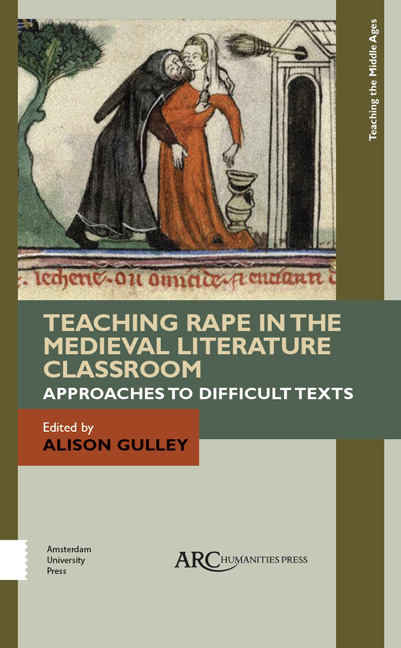Book contents
- Frontmatter
- Contents
- Acknowledgements
- Chapter 1 Introduction: Teaching Rape and Meeting the Challenges of the TwentyFirstCentury Classroom
- Chapter 2 Medieval Saints and Misogynist Times: Transhistorical Perspectives on Sexual Violence in the Undergraduate Classroom
- Chapter 3 Teaching Medieval Rape Culture across Genre: Insights from Victimology
- Chapter 4 Bringing the Bystander into the Humanities Classroom: Reading Ancient, Patristic, and Medieval Texts on the Continuum of Violence
- Chapter 5 From Bystander to Upstander: Reading the Nibelungenlied to Resist Rape Culture
- Chapter 6 Speech, Silence, and Teaching Chaucer’s Rapes
- Chapter 7 Classroom PSA: Values, Law, and Ethics in “The Reeve’s Tale”
- Chapter 8 “How do we know he really raped her?”: Using the BBC Canterbury Tales to Confront Student Skepticism towards the Wife of Bath
- Chapter 9 Teaching the Potiphar’s Wife Motif in Marie de France’s Lanval
- Chapter 10 Sexual Compulsion and Sexual Violence in the Lais of Marie de France
- Chapter 11 Troubadour Lyric, Fin’amors, and Rape Culture
- Chapter 12 The Knight Coerced: Two Cases of Raped Men in Chivalric Romance
- Chapter 13 Teaching Rape to the HeMan Woman Haters Club: Chrétien de Troyes at a Military School
- Chapter 14 Rape, Identity, and Redemption: Teaching “Sir Gowther” in the Community College Classroom
- Notes on Contributors
- Index
Chapter 14 - Rape, Identity, and Redemption: Teaching “Sir Gowther” in the Community College Classroom
Published online by Cambridge University Press: 23 January 2021
- Frontmatter
- Contents
- Acknowledgements
- Chapter 1 Introduction: Teaching Rape and Meeting the Challenges of the TwentyFirstCentury Classroom
- Chapter 2 Medieval Saints and Misogynist Times: Transhistorical Perspectives on Sexual Violence in the Undergraduate Classroom
- Chapter 3 Teaching Medieval Rape Culture across Genre: Insights from Victimology
- Chapter 4 Bringing the Bystander into the Humanities Classroom: Reading Ancient, Patristic, and Medieval Texts on the Continuum of Violence
- Chapter 5 From Bystander to Upstander: Reading the Nibelungenlied to Resist Rape Culture
- Chapter 6 Speech, Silence, and Teaching Chaucer’s Rapes
- Chapter 7 Classroom PSA: Values, Law, and Ethics in “The Reeve’s Tale”
- Chapter 8 “How do we know he really raped her?”: Using the BBC Canterbury Tales to Confront Student Skepticism towards the Wife of Bath
- Chapter 9 Teaching the Potiphar’s Wife Motif in Marie de France’s Lanval
- Chapter 10 Sexual Compulsion and Sexual Violence in the Lais of Marie de France
- Chapter 11 Troubadour Lyric, Fin’amors, and Rape Culture
- Chapter 12 The Knight Coerced: Two Cases of Raped Men in Chivalric Romance
- Chapter 13 Teaching Rape to the HeMan Woman Haters Club: Chrétien de Troyes at a Military School
- Chapter 14 Rape, Identity, and Redemption: Teaching “Sir Gowther” in the Community College Classroom
- Notes on Contributors
- Index
Summary
It's tempting to begin this essay with a discussion of the challenges involved in teaching medieval literature at the community college level. The problem, of course, is that any notion of “the community college level” is, by necessity, fragmentary. The defining characteristic of community college students is their diversity— demographically, economically, and intellectually— and that diversity makes it virtually impossible to talk about any single characteristic approach to teaching in the community college environment. My own institution, Weatherford College, attracts mainly “traditional” students, i.e., students aged eighteen to twentyfour who have recently graduated high school. As a result, the average age of our student body is twentythree, well below the national average age of twentynine for community college students. Nevertheless, almost every class I teach contains a few “nontraditional” students, usually older students with families and previous careers. Furthermore, even the traditional students, those who have recently graduated from high school, come from remarkably diverse environments. Weatherford College is approximately 25 miles west of the Dallas– Fort Worth metroplex. Many of our students come from the relatively affluent suburban districts to our east, but many more come from very small, mostly rural school districts to our west. Several of my students each semester compete on our nationally recognized Rodeo team, a fact which I mention simply to point out that my teaching experience may not have much in common with that of an instructor in more urban community colleges or in other parts of the country.
All this is not to say that my approach to teaching literature is not informed by the fact that I teach at a community college, of course. Because my students often come to higher education with very little previous exposure to literature— and, more to the point, because almost none of my students are potential English majors— both my choice of texts and my approach to those texts are likely different in many ways from those of my colleagues at major research universities, for example.
- Type
- Chapter
- Information
- Teaching Rape in the Medieval Literature ClassroomApproaches to Difficult Texts, pp. 199 - 207Publisher: Amsterdam University PressPrint publication year: 2018



